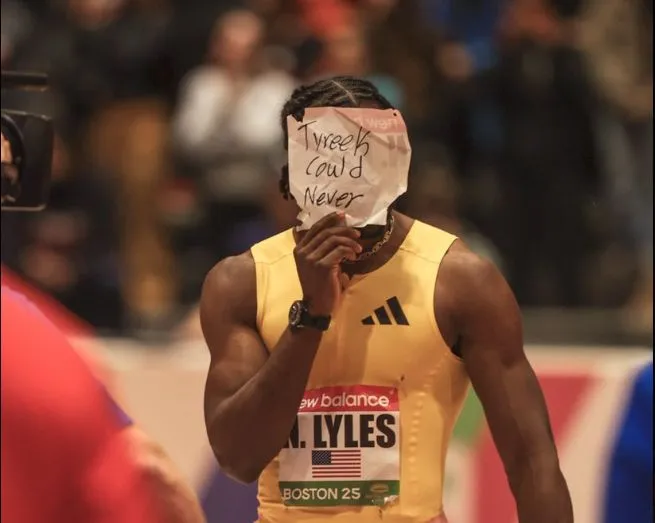Noah Lyles is a name synonymous with speed, showmanship, and resilience. From his early days in Virginia to dominating the world’s most prestigious tracks, Noah Lyles has proven time and again that he’s not just a sprinter—he’s a revolution in motion.
In this detailed profile, we explore Noah Lyles’ incredible rise, his career-defining moments, personal struggles, victories, and what makes him one of the greatest sprinters of the modern era.
Early Life and Family Influence
Born on July 18, 1997, in Gainesville, Florida, Noah Lyles was introduced to athletics through his parents. Both his mother Keisha Caine and father Kevin Lyles were competitive track and field athletes. From a young age, it was evident that running was in his DNA.
Lyles didn’t just inherit physical prowess—he was also deeply inspired by the discipline, mental toughness, and competitive spirit of his parents.
His younger brother, Josephus Lyles, also followed in his footsteps, and the Lyles brothers often competed and trained together, pushing one another to greatness.
Noah Lyles in High School: The Breakout Star
Noah Lyles quickly made a name for himself at T.C. Williams High School in Alexandria, Virginia. His explosive performances in the 100m and 200m races turned heads nationally.
In 2016, he was named the Gatorade National Boys Track and Field Athlete of the Year, a title that signaled his readiness for the world stage.
What separated Noah wasn’t just his speed—it was his swagger. From signature poses to theatrical finishes, he knew how to entertain. But behind the show was a hard-working teenager committed to greatness.
Turning Pro: Noah Lyles’ Game-Changing Decision
After qualifying for the 2016 U.S. Olympic Trials, Lyles made a bold move: he turned professional at just 18, signing with Adidas. It was a career-defining moment.
While many wondered if he should have gone the college route, Noah Lyles proved the doubters wrong. His professional debut in 2017 was nothing short of explosive, clocking 19.90 seconds in the 200m.
Lyles chose to train under Lance Brauman at Pure Athletics, a decision that laid the foundation for his world-class technique and consistency.
The Rise of Noah Lyles on the World Stage
Between 2017 and 2019, Noah Lyles emerged as the face of American sprinting. He consistently clocked sub-20-second 200m runs and began to eclipse even seasoned runners.
At the 2019 World Athletics Championships in Doha, Lyles won gold in the 200m with a time of 19.83 seconds, solidifying his dominance.
His performances earned global recognition, brand endorsements, and even comparisons to Usain Bolt, the Jamaican sprinting icon.
But while the media compared him to Bolt, Lyles insisted:
“I’m not the next Usain Bolt. I’m the first Noah Lyles.”
Noah Lyles vs. History: Breaking Usain Bolt’s Legacy
Though Noah Lyles respects Bolt’s legacy, he’s made it clear he’s carving his own path. In 2022, he ran a stunning 19.31 seconds in the 200m at the World Championships in Eugene, Oregon—breaking Michael Johnson’s long-standing American record.
That performance made him the third-fastest man in history over 200m, behind only Usain Bolt and Yohan Blake.
Noah’s goal? Go even faster. He’s openly discussed his ambition to break Bolt’s world record of 19.19 seconds.
This audacity has made him a fan favorite and a symbol of American resurgence in sprinting.
Mental Health, Identity, and Perseverance
Beyond the medals and headlines, Noah Lyles has been candid about his mental health struggles. He openly battled depression and anxiety, especially during the COVID-19 pandemic and the delayed Tokyo Olympics.
In a press conference after winning bronze in the 200m at Tokyo 2020, Lyles broke down in tears, revealing the mental toll the year had taken on him.
His honesty was widely praised and opened important conversations about athlete mental health. Noah’s vulnerability made him not just a star, but a role model.
He also champions ADHD awareness, a condition he manages while excelling in elite sport.
Training, Technique, and Discipline
Behind every blazing sprint by Noah Lyles is meticulous training. His workouts are intense, combining:
- Sprint drills
- Strength training
- Plyometrics
- Flexibility and core work
- Recovery and nutrition
Lyles’ technique is near flawless—his starts, top-end speed, and smooth transitions give him an edge over rivals.
His mental focus and competitive edge are honed through visualization and strict routines, making him a consistent performer even under pressure.
Noah Lyles’ Style and Cultural Influence
One of the reasons Noah Lyles stands out is his unique blend of athleticism and artistry. From bleach-blonde hair to anime-inspired celebrations, he has redefined what it means to be a sprinter in the modern era.
His interests include:
- Anime (he’s a big Dragon Ball Z fan)
- Fashion
- Music (he even released his own rap tracks)
- Mental wellness advocacy
Lyles has transformed track and field into a spectacle, bringing charisma, creativity, and energy to a sport often seen as too technical or traditional.
Olympic Ambitions and Redemption
The Tokyo 2020 Olympics were bittersweet for Noah. He was favored to win gold but finished with bronze in the 200m. For a man used to winning, it was a wake-up call.
Instead of sulking, Noah Lyles used the experience to fuel his fire.
By 2023 and 2024, he was back with a vengeance—winning double gold (100m and 200m) at the World Athletics Championships in Budapest.
Now all eyes are on Paris 2024, where Noah aims to cement his place in history.
He’s gunning for triple gold: 100m, 200m, and 4x100m relay—something only legends achieve.
Legacy and What Lies Ahead
At just 27, Noah Lyles has already achieved more than many athletes dream of. But he’s far from done.
Here’s what makes his legacy so significant:
- American Record Holder (200m – 19.31s)
- Multiple-time World Champion
- Olympic Medalist
- Mental health advocate
- Cultural icon
Looking forward, Noah has plans to break more records, promote mental health, and even create a media platform to spotlight track athletes.
Whether it’s on the track or off it, Noah Lyles is building a legacy that transcends sport.
Conclusion: Why Noah Lyles Matters
Noah Lyles is more than a sprinter. He’s an artist, an advocate, a competitor, and a cultural force. His story is one of talent, risk-taking, vulnerability, and relentless ambition.
By being unapologetically himself, he’s inspired a new generation of athletes to chase greatness not just with their legs—but with their hearts.
From high school tracks in Virginia to Olympic stadiums, Noah Lyles has run not just for medals—but for meaning.
And he’s only just getting started.
The Evolution of Noah Lyles: More Than Just Speed
To understand the magnitude of Noah Lyles’ rise, we must look beyond times and trophies. Noah represents evolution—not only in performance but in identity, sportsmanship, and cultural resonance. He hasn’t just changed the game—he’s changed how the game is perceived.
Elevating American Sprinting After Usain Bolt
After the retirement of Usain Bolt, track and field found itself in a vacuum. The charismatic Bolt had dominated the sport for over a decade. Who could possibly fill that void?
Enter Noah Lyles.
With his flair, competitiveness, and powerful sprints, Noah not only filled that space—he redefined it. He became the post-Bolt superstar who made fans believe in sprinting again.
He brought back the magic to American track and field, standing tall as the athlete who gave the U.S. its confidence back in the 200m.
Noah Lyles’ Rivalries: Fueling the Fire
Competition sharpens champions, and Noah Lyles has embraced his share of rivalries.
One of the most talked-about matchups has been between Lyles and fellow American sprinter Erriyon Knighton, a teenage prodigy. Knighton’s rapid rise sparked media-driven comparisons and projected a generational showdown.
Instead of trash talk, Lyles showed respect but made one thing clear—he’s still the man to beat. In multiple head-to-head races, Noah proved that experience, consistency, and mental toughness are as important as raw speed.
Their duels have elevated the sport and attracted millions of viewers—young fans especially. Lyles doesn’t just win races; he builds narratives.
A Voice for the Voiceless: Noah Lyles and Activism
In the modern athletic landscape, sports and social issues often intersect. Unlike athletes who shy away from politics or activism, Noah Lyles uses his platform to spark conversations.
During racial justice protests in 2020, Lyles voiced his support for equality, justice, and mental health advocacy. He spoke out against police brutality, tweeted passionately, and remained active in community engagement.
He’s not afraid to be controversial if it means standing on the right side of history. His stance resonates deeply with Gen Z athletes and fans who value authenticity and purpose.
Noah Lyles in the Media: A Star Across Platforms
Today’s athlete needs more than medals—they need a media presence. And Noah Lyles excels at this too.
His social media platforms, including Instagram, X (Twitter), and YouTube, showcase everything from training sessions to anime commentary, music production, and life philosophies. His digital presence has made him relatable and influential beyond track enthusiasts.
He’s been featured in:
- GQ Sports
- The New York Times
- TIME Magazine
- The Players’ Tribune
- NBC Sports documentaries
Lyles also partnered with brands like Adidas, Beats by Dre, and Visa—not just for sponsorships but to create storytelling opportunities.
Breaking Barriers in Fashion and Expression
Few sprinters have used fashion as a language the way Noah Lyles has. Whether it’s metallic spikes, statement hairstyles, or customized outfits, he treats his appearance like part of his performance.
In a sport that often discourages individuality, Lyles has changed the rules. His belief is simple:
“When you look good, you feel good. When you feel good, you run fast.”
From walk-ins to press conferences, Noah oozes confidence and encourages athletes to be unapologetically themselves—no matter how flashy, eccentric, or bold that may be.
He’s turned meets into fashion runways, drawing fans who care as much about his vibe as they do his velocity.
The Tokyo Experience: From Disappointment to Determination
The Tokyo 2020 Olympics, postponed due to the pandemic, was a testing ground for Noah Lyles. He entered as a favorite in the 200m but walked away with a bronze. That alone would discourage many.
But Noah Lyles viewed the bronze not as a failure—but a lesson. He later admitted he wasn’t in the right mental space and struggled with performance anxiety and pandemic isolation.
What impressed the world more than his medal was his post-race honesty. On live TV, Lyles cried, opened up about his therapy journey, and gave a rare insight into the pressure elite athletes face.
He may not have won gold—but he won hearts.
Noah Lyles’ Music Journey: Athlete Meets Artist
Not content with being the fastest man on the track, Noah Lyles has also stepped into the music world. Under the name “Nojo18,” he has released tracks that blend hip-hop, motivational lyrics, and experimental beats.
For Lyles, music isn’t just a hobby—it’s therapy. It allows him to decompress, express, and connect with fans in a different way.
His music often features themes of mental strength, overcoming doubt, and celebrating individuality—all of which mirror his own journey.
This creative outlet also highlights how modern athletes are multi-dimensional. Lyles is proof that greatness isn’t confined to one discipline.
The Science Behind Noah Lyles’ Speed
While his natural talent is evident, the science behind Noah Lyles’ performance is even more impressive. His stride frequency, ground contact time, and biomechanical form have been studied by sports scientists and coaches globally.
Some of the factors contributing to his world-class speed:
- Stride Efficiency: At top speed, he covers approximately 2.6 meters per stride.
- Acceleration Phase: His 0–30 meter splits are among the fastest ever recorded.
- Muscle Recovery: Cryotherapy, stretching, and massage keep him in top condition.
- Nutrition: High-protein, high-carb diet with vitamin-rich supplementation.
His team utilizes data tracking, motion capture, and resistance training to optimize every fraction of a second. For Lyles, speed is science—and art.
Noah Lyles and Youth Empowerment
One of Noah Lyles’ long-term missions is to inspire and educate youth. Through clinics, workshops, and motivational talks, he encourages young athletes to embrace sport not just as a goal—but as a path to discipline and self-discovery.
He’s launched several outreach initiatives in partnership with Adidas and youth nonprofits, particularly in underserved communities.
Whether mentoring high school sprinters or visiting children’s hospitals, Lyles gives back with the same passion he brings to competition.
His message:
“You can be fast, you can be loud, and you can be yourself—all at once.”
The Road to Paris 2024: The Ultimate Test
Now, all roads lead to Paris 2024, the biggest opportunity yet for Noah Lyles to become an Olympic legend.
He’s targeting:
- Gold in 100m
- Gold in 200m
- Gold in 4x100m relay
This triple-gold ambition is rare air—Bolt territory. And Lyles is not shying away. With confidence surging and times improving, he’s poised to make history.
As he puts it:
“My legacy starts with being the best sprinter in the world—and ends with inspiring people far beyond track.”
Why Noah Lyles Will Be Remembered
When history remembers Noah Lyles, it won’t just be for numbers on a stopwatch.
It will be for:
- Breaking records and stigma
- Leading sprints and conversations
- Winning races and hearts
- Redefining cool and courageous
In the long list of champions, few leave behind both speed and spirit. Lyles is crafting a legacy not just with spikes—but with soul. https://whatsapp.com/channel/0029Vb5vwzxAInPgXwW5Rs3Q



